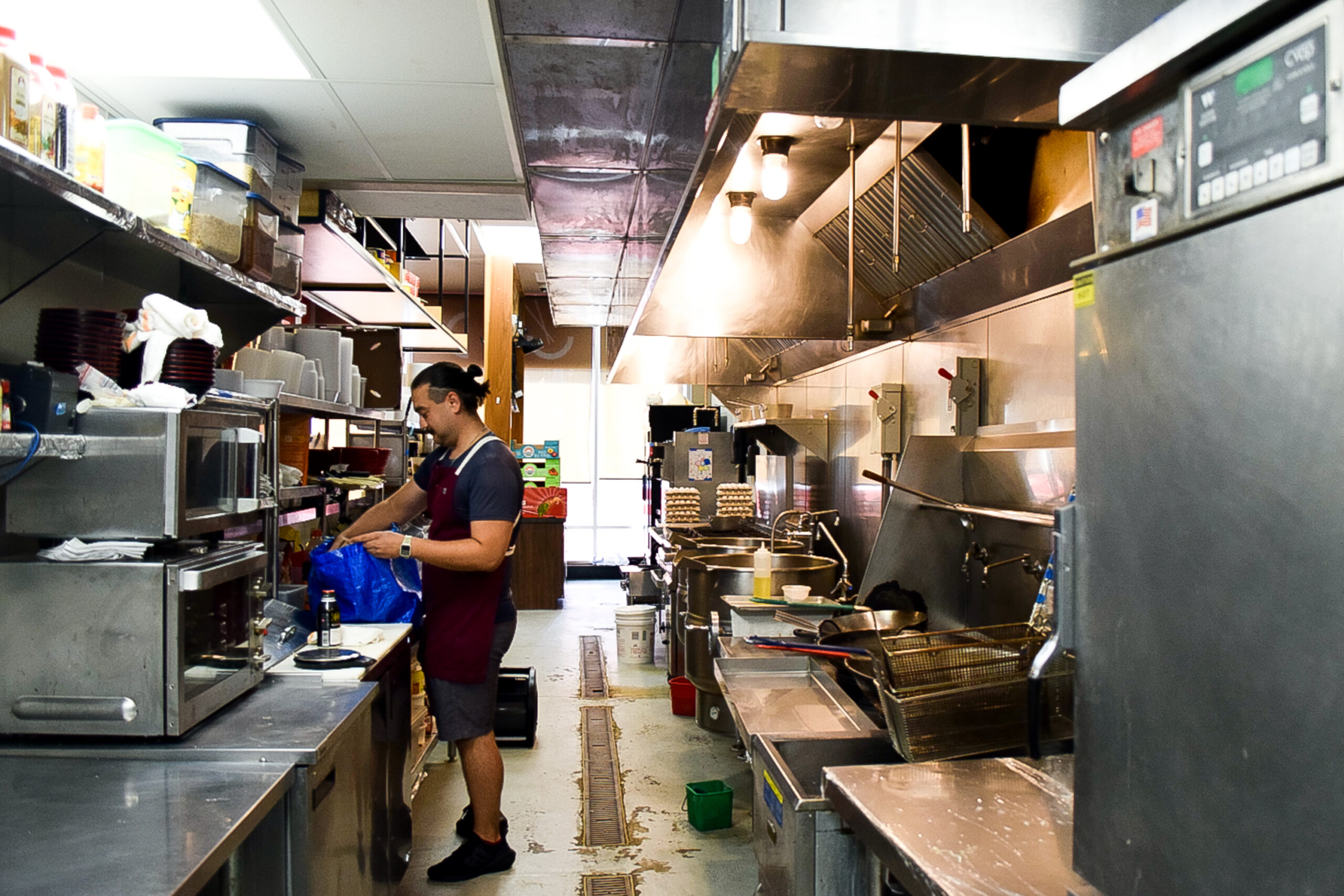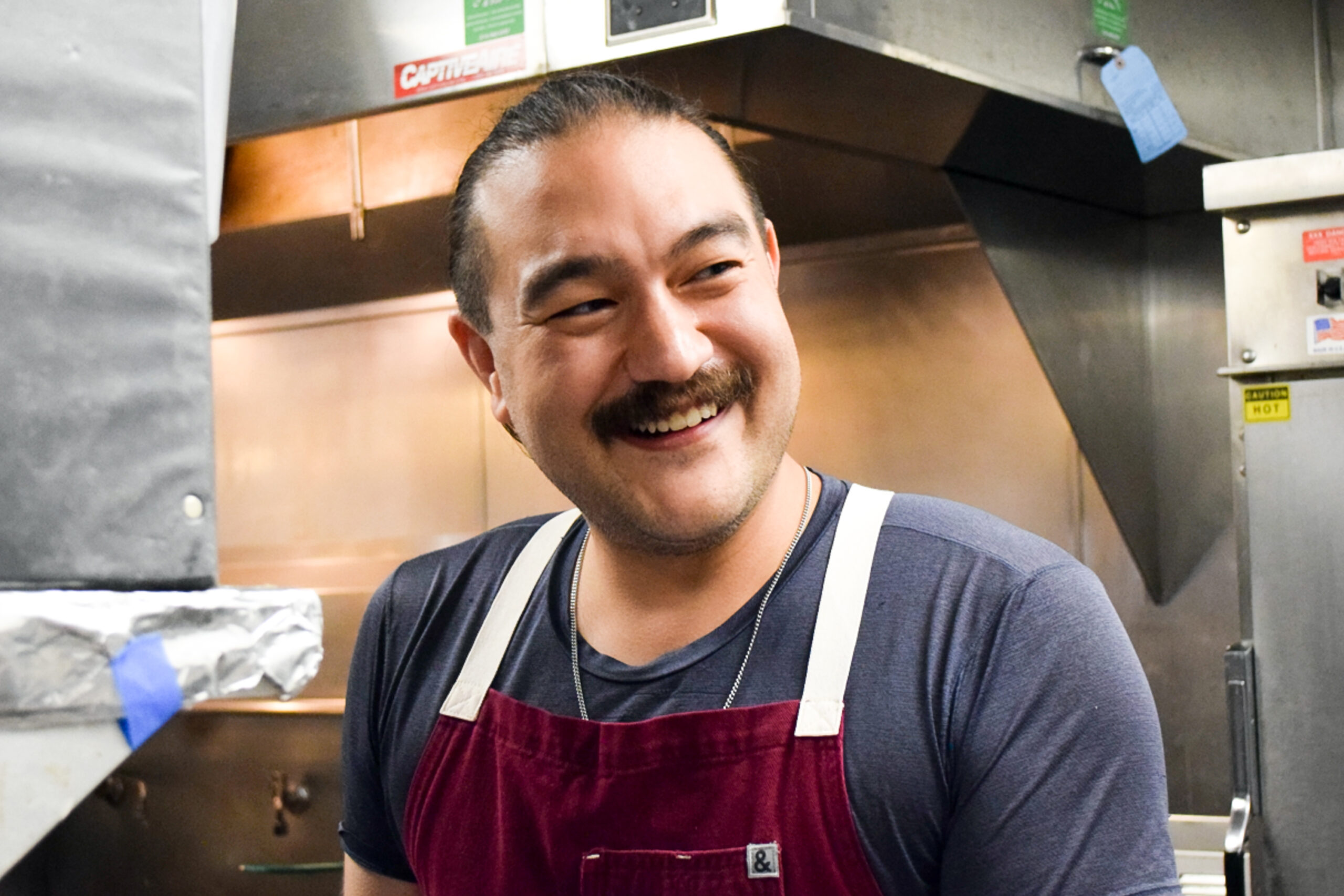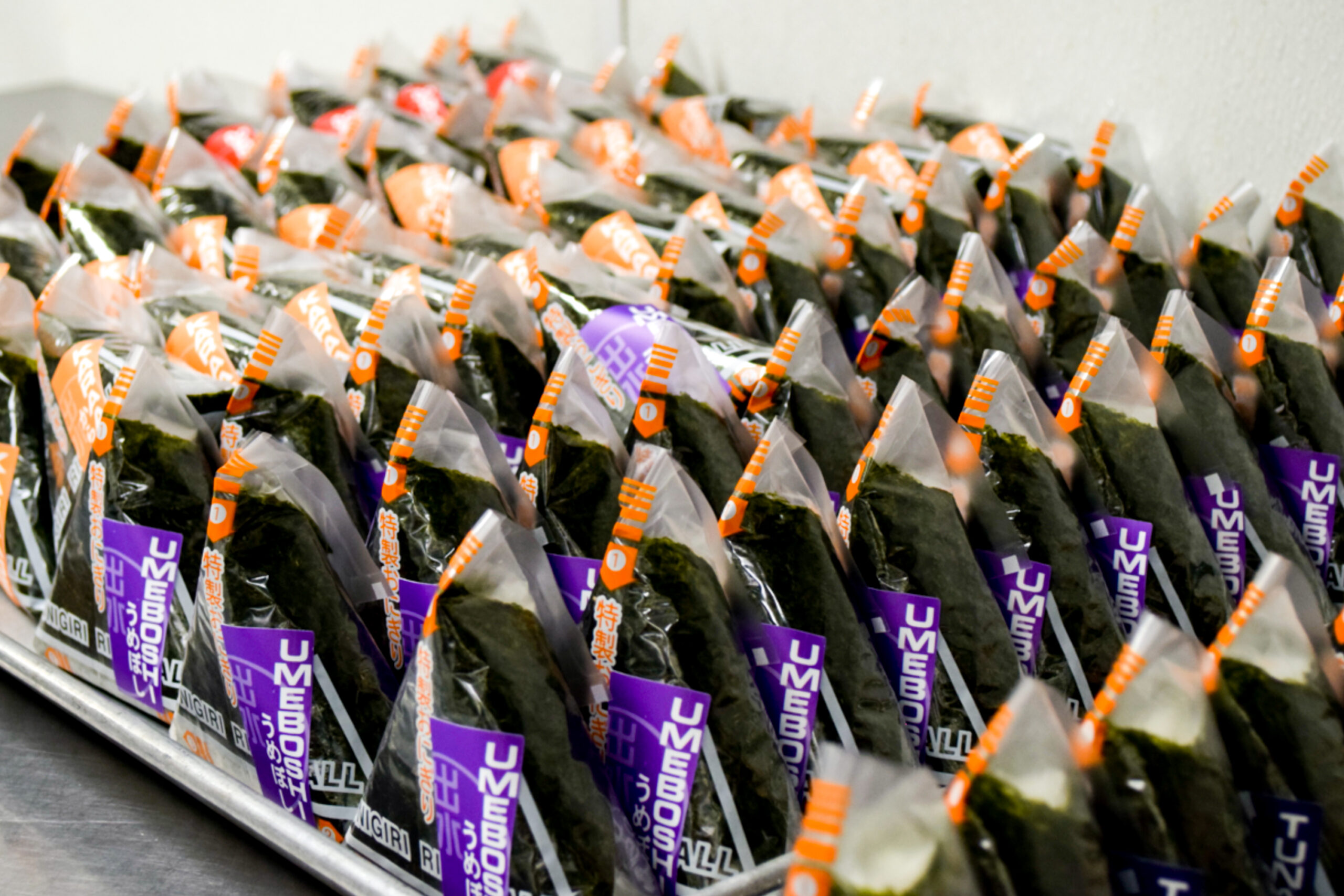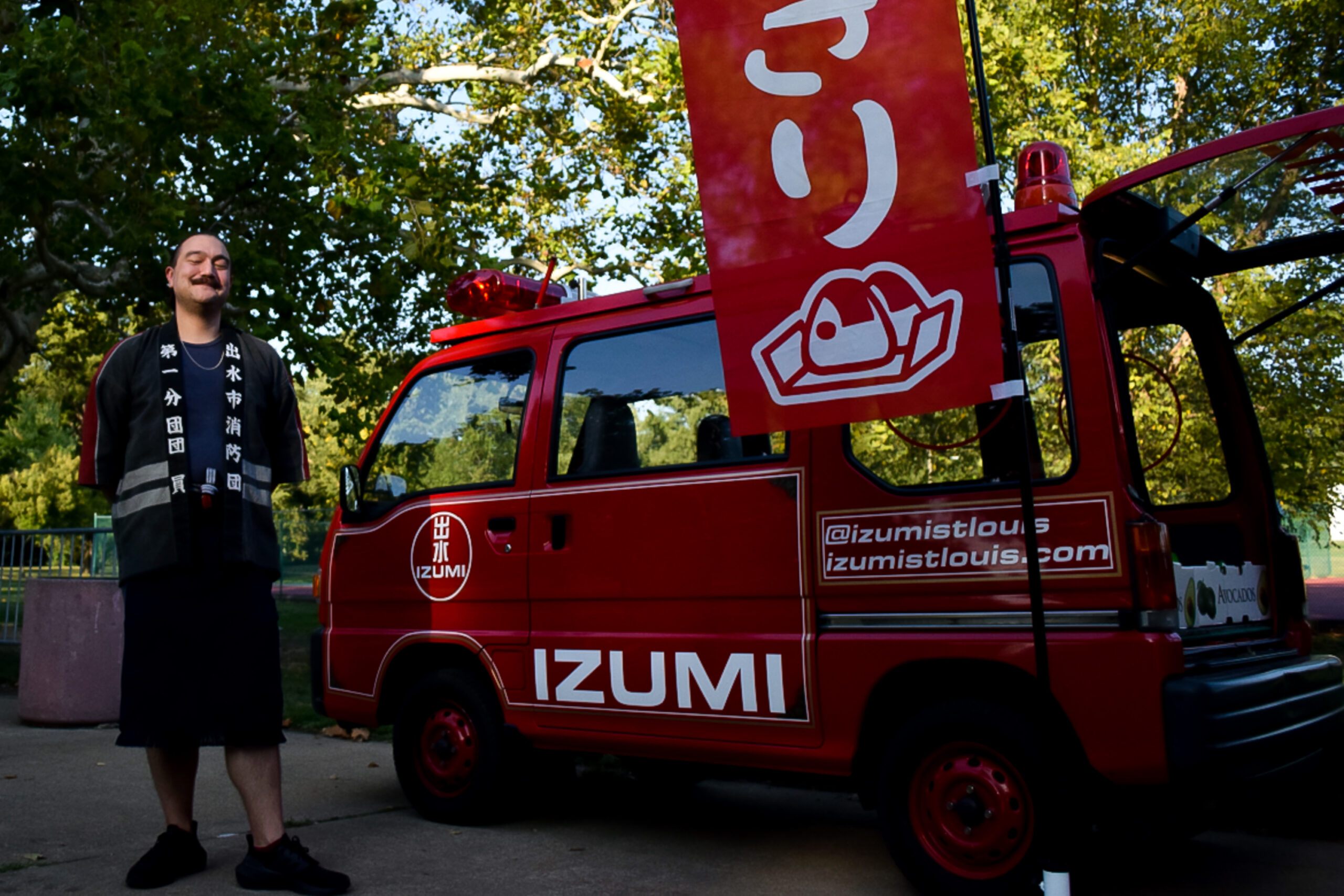
EMILY WHANG/ NEXTGENRADIO
What is the meaning of
home?
Sadie Wittenberg meets with Kurt Bellon, the owner of the St. Louis pop-up Japanese food truck, Izumi. Bellon hopes to share his sense of home through his culture’s food. Serving a variety of on-the-go convenience foods, or “konbini,” Izumi acts as a pocket of everyday Japanese life and a home away from home.
‘A really magical thing’: Food truck owner channels Japanese heritage in St. Louis
Listen to the Story
Click here for audio transcript
——-
KURT Okay, so this is called Katori Senko, and it’s basically like a citronella incense coil, keeps the mosquitoes away. It smells like Japan for me and my siblings because whenever we would visit our grandfather’s house, he would have it lit in the yard, on the porch. And just smelling this, kind of, is just a part of the whole transportative aspect of this.
KURT It’s functional as well as nostalgic for me. (package crinkling over mhmm)
KURT Awesome, cool, well thank you so much.
KURT Thank you.
KURT Enjoy.
——
KURT My name is Kurt Bellon.
KURT So I’ve always wanted to do a Japanese concept in St. Louis
KURT So Izumi, it can be a lot of things, but in particular. It’s the name of the town that my mother and her family grew up in.
KURT I really did want to pay homage to my roots and my mother’s hometown and my favorite place to visit in Japan.
KURT So I do a pop up slash food truck. It’s kind of this anti food truck because I do no cooking on the truck itself because it is a former Japanese Kei Car and a fire truck, and it’s very small and it has no cooking equipment at all. And so that’s what makes it a very unique food truck, is that it’s kind of this anti food truck in a way.
KURT So Izumi is reaching the end of its third season, which is actually like a perfect amount, because traditionally in Japanese culture, if you try something, you should do it for three years, is kind of the rule of thumb. And so, coming at the end of this third food truck season, I’m just really very grateful, and I feel very lucky for the amount of great reception that it’s garnered in St. Louis.
——
KURT What’s up? How are you?
KURT Do you have any questions or need recommendations on anything?
KURT Okay.
SPEAKER 2 Can I get the curry sando?
KURT Yeah of course
KURT You can just tap right here. Awesome.
KURT Yeah. Great to see you. Take care.
KURT We went to Affton high school together, so it’s really nice. When they come up and they’re like, Oh, we’re so excited to see that you’re the one doing it.
KURT And it’s just. And as much as I think I’m an introvert, like, I really do get powered up by, by serving folks in this wonderful little taste of Japan.
KURT Homemade Onigiri are usually the shape of your and size of your mother’s hand or whoever makes it. And so it’s a very personal thing.
KURT So mentaiko, that’s like a fine spicy fish roe
KURT It’s a very classic Onigiri, but not as classic as this Umeboshi one. Umeboshi is a Japanese pickled plum, and it’s such a ubiquitous traditional Japanese flavor. It’s all over the place in Japan. But in St Louis there’s hardly any restaurants that offer it.
KURT It’s a little bit much, especially if you’ve never tasted that flavor before. But in this rice ball, it’s nice and balanced out and it’s quintessential as like pepperoni pizza. So.
——–
KURT Trying to capture and trying to bottle up that experience of being able to visit Japan.
KURT to be able to kind of transport not only the guests and the people I serve, but myself in this really unique concept is a really special thing for me.
KURT And it’s just a really magical thing that I get to do this.
KURT Home to me is that idea and that feeling of Japan. Because it’s a place I just rarely get to visit and being able to do my best to try to replicate that feeling is a big part of that idea of home. That It’s not always a physical place, but that idea and that feeling of being somewhere really comfortable.
———
KURT I just always remember that very melancholy feeling of flying back from Japan because it’s kind of, it’s just across an ocean and just always there … So it’s a very, there’s very much a duality of home that I feel.
At 3:30 p.m., Kurt Bellon packs up his small red firetruck — an authentic Kei Car imported from Japan — and heads out to his pop-up food stand, Izumi, next to the Francis Park Rockwell Beer Garden in St. Louis Hills. The truck is named after his mother’s hometown in Japan.
He parks “Zumi,” as he lovingly calls his truck, and assembles his tent. Though the truck is small, he unloads four coolers, a large tent, a foldable table, two boxes of Japanese snacks, a large banner that reads “onigiri” in simplified Japanese script, and a curtain his mother made that reads “Izumi.”
Every Monday, Bellon begins his day at about 4:30 a.m. in the kitchen of a local restaurant. He cooks and packages a variety of Japanese “konbini” — a shortened version of the word “convenience” — food for his pop-up event later that evening.

Kurt Bellon, 34, packs away food to take to his food truck on Monday, Sept. 18, 2023, while discussing his motivations for his food truck and what inspires him to continue his work everyday at Nudo House on the Delmar Loop. “That’s the whole thing with the preorder or the pre-made aspect of it,” Bellon said. “No matter how good of a host you are, if you’re busy on the line and you also have to serve people, it’s just not the not the right sort of vibe sometimes.” SADIE WITTENBERG / NEXTGENRADIO

Kurt Bellon, 34, reacts while standing in the Nudo House kitchen, where he prepares his food on Monday, Sept. 18, 2023, on the Delmar Loop. Bellon says his motivation for his food truck isn’t profit — it’s connection. “Honestly, chasing that monetary reward isn’t the thing that got me started on this path in the first place.” SADIE WITTENBERG / NEXTGENRADIO

More than a dozen premade onigiri rest on a metal tray, waiting to be purchased by customers on Monday, Sept. 18, 2023, at Nudo House on the Delmar Loop. “It’s like the quintessential on-the-go snack sort of thing,” Izumi owner Kurt Bellon said. “You could pack a bunch for maybe a trip or hike or a field trip or something like that.” SADIE WITTENBERG / NEXTGENRADIO
As he sets up, he talks with passersby. This is where he thrives — getting to engage with customers and share his sense of home through nostalgic foods with the St. Louis community.
Bellon’s main fare is onigiri and sandos. Onigiri are rice balls filled with different savory foods, like pickled plum or fried chicken. Sandos, a shortened version of “sandwiches,” can be sweet or savory, with a variety of fillings such as katsu pork cutlets and eggplant, as well as whipped cream and fruit — one of his most popular orders.
These foods connect Bellon — who is half Japanese — with his heritage and childhood. He remembers his mother filling the triangle-shaped onigiri with the family’s leftovers.
“Homemade onigiri are usually the shape or size of your mother’s hand or whoever makes it,” Bellon said. “And so it’s a very, very personal thing.”
After setting up, Bellon pulls on a short fireman’s jacket his cousin sent him from Japan, paying homage to his truck’s original use.
He takes out a citronella coil meant to keep the mosquitos away, explaining the smell heightens this authentic feeling of home. His grandfather always had one lit for backyard barbecues in Japan.
His first customers arrive — old friends from high school. They order a curry sando and catch up on each others’ lives.
“I just get so much support from people,” Bellon said. “It’s just really nice when they come up and they’re like, ‘Oh, we’re so excited to see that you’re the one doing it.’ … I really do get powered up by serving folks in this wonderful little taste of Japan.”
As more customers arrive at the pop-up, Bellon shares how to properly open his homemade onigiri, which comes with its own edible seaweed napkin. Next to a maneki-neko (a cat figurine with a waving arm), he displays other konbini, including shrimp-flavored chips, sesame crackers and Japanese strawberry milk.
As the smell of the citronella wafts through the air and the truck’s banner flaps in the wind, Izumi channels a little pocket of Japan, thousands of miles away from the real thing.
Bellon says by bringing traditional Japanese foods to St. Louis, he tries to “bottle up that experience of being able to visit Japan.” Home, he says, is not necessarily a physical place. But by sharing the Japanese foods he loves, he gets pretty close.
“To be able to transport not only the guests and the people I serve, but myself, in this really unique concept is a really special thing for me,” Bellon said. “It’s just a really magical thing that I get to do.”

Kurt Bellon, 34, stands next to his food truck, Izumi, an imported Japanese fire truck. “It’s just a little tiny, cute little truck that you just don’t imagine ever seeing,” Bellon says. “And when it pops up, it’s just a nice treat for everybody.” SADIE WITTENBERG / NEXTGENRADIO
“Homemade onigiri are usually the shape or size of your mother’s hand or whoever makes it,” Bellon said. “And so it’s a very, very personal thing.”
Right: The food truck Izumi is about 6,900 from the city of Izumi in Japan, where Bellon’s mother is from. The word Izumi means “spring” or “fountain” in Japanese. The city of Izumi is located at the point where the Komenotsu River meets the sea. BRENT JONES / NEXTGENRADIO

